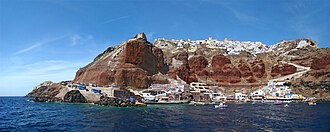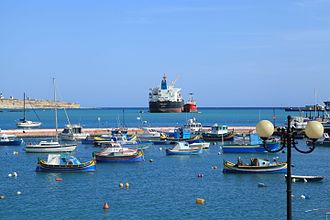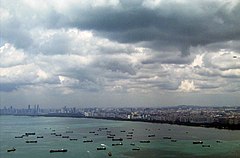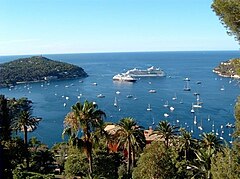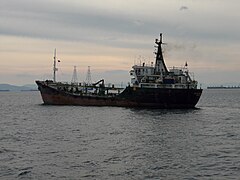Roadstead
A roadstead (or roads – the earlier form)[a] is a body of water sheltered from rip currents, spring tides, or ocean swell where ships can lie reasonably safely at anchor without dragging or snatching.[3][4] It can be open or natural, usually estuary-based, or may be created artificially.[5] In maritime law, it is described as a "known general station for ships, notoriously used as such, and distinguished by the name".[6]
Definition
A roadstead can be an area of safe anchorage for ships waiting to enter a port, or to form a convoy. If sufficiently sheltered and convenient, it can be used for the transshipment of goods, stores, and/or troops; or, for the transfer of same to and from shore by lighters.[3][b] In the days of sailing ships, some voyages could only easily be made with a change in wind direction, and ships would wait for a change of wind in a safe anchorage, such as the Downs or Yarmouth Roads.
In cultural references
Robinson Crusoe
Daniel Defoe has Robinson Crusoe recall an early journey in the coastal trade:
The sixth day of our being at sea we came into Yarmouth Roads; the wind having been contrary, and the weather calm, we had made but little way since the storm. Here we were obliged to come to an anchor, and here we lay, the wind continuing contrary, viz., at southwest, for seven or eight days, during which time a great many ships from Newcastle came into the same Roads...[page needed]
Notable roadsteads
- Basque Roads, France
- Roadstead of Brest, France
- Carrick Roads, England
- Castle Roads, Bermuda
- Cherbourg Harbour (la Grande Rade), France (artificial)
- The Downs, England
- Fayal Roads, Azores, Portugal (Battle of Fayal)
- Gage Roads, Western Australia
- Hampton Roads, Virginia, US
- Kossol Roads, Micronesia
- Lahaina Roads, Hawaii, US
- The Nore, England
- Puget Sound, Washington, US
- Royal Roads, Canada
- Scapa Flow, Scotland
- Schillig Roads, Germany
- Spithead, England
- Tail of the Bank, Scotland (Clyde estuary)
- Toulon Roads, France
- Road Town, Tortola, British Virgin Islands
- Rede van Texel, Texel, Netherlands (historic)
See also
Notes
- ^ Charts and nautical publications often use roads rather than roadsteads.[1] Roads is the earlier term.[2]
- ^ For example, in the Second World War, many merchant ships and many troops arriving at the UK were unloaded/disembarked from ships anchored at the Tail of the Bank in the upper Clyde estuary.[7]
References
- ^ Walker, George K. Definitions for the Law of the Sea: Terms Not Defined by the 1982 Convention. Leiden: Martinus Nijhoff Publishers, 2012.
- ^ Little, William; Fowler, H W; Coulson, Jesse; Onions, C T; Friedrichsen, G. W. S. (1983). The Shorter Oxford English Dictionary on Historical Principles (Volume II) (3rd ed.). London: Book Club Associates. p. 1838.
- ^ a b United States Army technical manual, TM 5-360. Port Construction and Rehabilitation. Washington: United States. Government Printing Office, 1964.
- ^ Oxford Dictionaries: Definition of roadstead in English
- ^ Roadstead: Extensive Definition
- ^ Black's Law Dictionary: What is roadstead?
- ^ Robins, Nick (21 January 2014). "Clyde Anchorages Emergency Port". Scotland and the Sea: The Scottish Dimension in Maritime History. Seaforth Publishing. p. 175. ISBN 978-1-4738-3441-5.
External links
- Harbor Types of the World's Large Sized Ports, Hofstra University site
- Ports and Ocean Distances, searoutes.com
- Roadsteads around the world
Golden Fleece lying at anchor in the roadstead (painting by Jack Spurling, 1929)
| Wikimedia Commons has media related to Roadsteads. |
| Look up roadstead in Wiktionary, the free dictionary. |
Information
Article Roadstead in English Wikipedia took following places in local popularity ranking:
- 2 place in 2020-06-24
About the page
Presented content of the Wikipedia article was extracted in 2021-06-13 based on https://en.wikipedia.org/?curid=8173057
